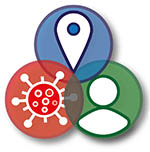Accessibility statement
We want as many people as possible to be able to use our website and we are continually working towards improving its accessibility.
This statement applies to content published on: sites.manchester.ac.uk/covid19-national-project
Other websites that also belong to The University of Manchester and use manchester.ac.uk sub-domains are managed locally and will publish separate statements with information relevant to them. These include websites of our academic Schools and research institutes, among others.
We follow general principles of usability and universal design, and endeavour to meet level 2 (AA) of the Web Content Accessibility Guidelines (WCAG) 2.1.
Our websites will allow you to:
- zoom in up to 200% without the text spilling off the screen;
- navigate most of the website using just a keyboard or speech recognition tools;
- listen to most of the website using a screen reader.
How accessible this website is
We know some parts of this website are not fully accessible. For example:
- Some sections cannot be navigated with just a keyboard.
- Some older PDF documents may not be fully accessible to screen reader software.
- Some videos may not have captions or audio descriptions.
Please see the Technical Information section below for more detailed information on known accessibility issues.
Making changes to your device
AbilityNet has advice on making your device easier to use if you have a disability.
Also, the University’s Disability Advisory and Support Service (DASS) website offers up-to-date information for prospective students and staff with specific learning difficulties, disabilities, sensory impairments, mental health difficulties and medical conditions.
Reporting accessibility problems with this website
Please email web-accessibility-bmh@manchester.ac.uk if you have an accessibility query (including about content not within the scope of the accessibility regulations), identify any problems not listed on this page or think we’re not meeting accessibility requirements.
Please provide the web address (URL) of the page(s) in which you find the problem, a description of the issue and your name. We will consider your request and get back to you within 10 working days.
The Equality and Human Rights Commission (EHRC) is responsible for enforcing the Public Sector Bodies (Websites and Mobile Applications) (No. 2) Accessibility Regulations 2018 (the ‘accessibility regulations’).
If you’re not happy with how we respond to your complaint please let us know. If you remain unsatisfied, contact the Equality Advisory and Support Service (EASS).
Technical information about this website’s accessibility
We are committed to making our website accessible, in accordance with the relevant accessibility regulations.
This website is partially compliant with the WCAG 2.1 AA standard, due to the instances of non-compliance and exceptions listed below.
Non-accessible content
The content listed below is non-accessible for the following reasons:
Non-compliance with the accessibility regulations
Accessible Rich Internet Applications (ARIA):
- ARIA attributes are missing, making it difficult for assistive technologies to interpret our webpages.
Issues with navigation, text and images:
- Some images do not have a text alternative, so people using a screen reader cannot access the information.
- Colour contrast may not be sufficient on some webpages which could make these pages difficult to read for some users with visual impairments.
- Mega menus are not accessible using a keyboard so people using a screen reader may find navigating our website difficult.
- Page zoom is restricted and font size is fixed.
- Not all links are clearly identifiable.
- Headings on some pages are not structured.
- Inline frames do not have a text alternative.
These websites are undergoing a programme of redevelopment, moving them into a new framework. This work will be completed by December 2022.
Content that’s not within the scope of the accessibility regulations
PDFs and other documents
Some non-essential PDF documents that were published before 23 September 2018 may not be fully accessible. All subsequent PDF documents will comply with accessibility regulations.
Third party-content
Our site uses third-party content which may not be fully accessible. This includes content we publish on social media channels such as Twitter or YouTube, or documents hosted on the digital platform Issuu.
We are responsible for ensuring the accessibility of the content we produce, however we have no control over the accessibility of these platforms.
What we’re doing to improve accessibility
These websites are undergoing a programme of redevelopment, moving them into a new framework. This work will be completed by January 2022.
We are continually working on our content and site structure, and finding ways to make the site more intuitive and easy to navigate. We are developing guidelines on how to create accessible content to help those colleagues working on our websites.
This statement was prepared on 8th December 2021.
